- Home
- Gustave Flaubert
Three Tales
Three Tales Read online
THREE TALES
GUSTAVE FLAUBERT, the younger son of a provincial doctor, was born in the town of Rouen in 1821. While still a schoolboy, full of romantic scorn for the bourgeois world, he professed himself ‘disgusted with life’. At the age of eighteen he was sent to study law in Paris, but had no regrets when a mysterious nervous ailment interrupted this career after only three years. Flaubert retired to live with his widowed mother in the family home at Croisset, on the banks of the river Seine, near Rouen. Supported by a private income, he devoted himself to his writing.
In his early work, particularly The Temptation of Saint Antony, he gave free rein to his flamboyant imagination, but on the advice of his friends he subsequently disciplined this romantic exuberance in an effort to achieve artistic objectivity and a harmonious prose style. This perfectionism cost him enormous toil and brought him only limited success in his own lifetime. After the publication of Madame Bovary in 1857 he was prosecuted for offending public morals; his exotic novel Salammbô (1862) was criticized for its encrustations of archaeological detail; Sentimental Education (1869), intended as the moral history of his generation, was largely misunderstood by the critics; and the political play The Candidate (1874) was a disastrous failure. Only Three Tales (1877) was an unqualified success, but it appeared when Flaubert's spirits, health and finances were all at their lowest ebb.
After his death in 1880 Flaubert's fame and reputation grew steadily, strengthened by the publication of his unfinished comic masterpiece Bouvard and Pécuchet (1881) and the many remarkable volumes of his correspondence.
ROGER WHITEHOUSE studied French at Oxford and at the University of Warwick, specializing in Renaissance studies. He taught at the Ecole Normale Supérieure and the Sorbonne, and from 1970 to 2000 at Bolton Institute. He was for many years Head of Literary Studies there and since 2000 has been a research fellow. He is currently working on a translation of Zola's La Bête humaine and is editing an anthology of the work of Emile Verhaeren.
GEOFFREY WALL is a literary biographer, travel writer and translator. His biography of Flaubert was published to great acclaim in 2001. His translations of Flaubert, published by Penguin Books, include Madame Bovary (1992), The Dictionary of Received Ideas (1994), Selected Letters (1996) and Sentimental Education (2004). He is currently writing a biography of Napoleon.
GUSTAVE FLAUBERT
Three Tales
Translated by ROGER WHITEHOUSE
With an Introduction and Notes by
GEOFFREY WALL
PENGUIN BOOKS
PENGUIN BOOKS
Published by the Penguin Group
Penguin Books Ltd, 80 Strand, London WC2R 0RL, England
Penguin Group (USA) Inc., 375 Hudson Street, New York, New York 10014, USA
Penguin Books Australia Ltd, 250 Camberwell Road, Camberwell, Victoria 3124, Australia
Penguin Books Canada Ltd, 10 Alcorn Avenue, Toronto, Ontario, Canada M4V 3B2
Penguin Books India (P) Ltd, 11 Community Centre, Panchsheel Park, New Delhi - 110 017, India
Penguin Group (NZ), cnr Airborne and Rosedale Roads, Albany, Auckland 1310, New Zealand
Penguin Books (South Africa) (Pty) Ltd, 24 Sturdee Avenue, Rosebank 2196, South Africa
Penguin Books Ltd, Registered Offices: 80 Strand, London WC2R 0RL, England
www.penguin.com
First published as Trois contes 1877
First published in Penguin Classics 2005
5
Translation copyright © Roger Whitehouse, 2005
Editorial material copyright © Geoffrey Wall, 2005
All rights reserved
The moral right of the editors has been asserted
Except in the United States of America, this book is sold subject to the condition that it shall not, by way of trade or otherwise, be lent, re-sold, hired out, or otherwise circulated without the publisher's prior consent in any form of binding or cover other than that in which it is published and without a similar condition including this condition being imposed on the subsequent purchaser
ISBN: 9781101490945
Contents
Chronology
Introduction
Further Reading
Translator's Note
A SIMPLE HEART
THE LEGEND OF SAINT JULIAN HOSPITATOR
HERODIAS
Notes
Chronology
1802 Achille Flaubert, Gustave's father, arrives in Paris to study medicine.
1810 Achille Flaubert moves to Rouen to work as deputy head of the hospital (known as the Hôtel-Dieu).
1812 Achille Flaubert marries the adopted daughter of the head of the Hôtel-Dieu.
1813 Birth of Achille-Cléophas, Gustave's brother.
1819 Achille Flaubert appointed head of Hôtel-Dieu on the death of his superior. The family moves to the residential wing of the hospital.
1820 Achille Flaubert begins to buy parcels of land and property outside Rouen.
1821 December: birth of Gustave Flaubert.
1824 July: birth of Caroline Flaubert, Gustave's sister.
1825 The servant ‘Julie’ enters the service of the Flaubert family.
1830 First surviving letter by Flaubert.
1832 Enters College de Rouen as a boarder. Creation of Le Garçon, an anarchic Rabelaisian joker.
1835 Summer holidays on the coast, at Trouville. Meets the Collier family.
1836 First encounter with Elisa Schlésinger, on the beach at Trouville.
1839 Elder brother qualifies in medicine and marries.
1840 Passes final school examinations; voyage to Corsica with Jules Cloquet. Amour de voyage, in Marseille, with Eulalie Foucaud.
1841 November: registers as law student in Paris, though continues to live at home.
1842 July: moves to Paris. December: passes first-year law exams.
1843 February: writing early version of L'Education sentimentale (Sentimental Education). March: first meeting with Maxime Du Camp. August: fails second-year law exams.
1844 January: first nervous attack. April: father buys house at Croisset. June: Flaubert family moves to Croisset.
1845 March: sister marries Émile Hamard. April–June: family travelling in Italy. November: father falls ill.
1846 January: father dies; sister gives birth to a daughter. March: sister dies. July: first encounter with Louise Colet; marriage of Alfred Le Poittevin. August: begins friendship with Louis Bouilhet; first letter to Louise Colet.
1847 May – August: walking tour in Brittany with Maxime Du Camp.
1848 February: arrives in Paris, with Bouilhet, to see the street-fighting. April: death of Alfred Le Poittevin. May: begins work on first version of La Tentation de Saint Antoine ( The Temptation of Saint Antony). August: break with Louise Colet. September: finishes first version of Saint Antoine. October: embarks with Du Camp on eighteen-month tour of the Orient.
1850 February: voyage up the Nile. May: crossing the desert by camel. August: death of Balzac; Flaubert and Du Camp arrive in Jerusalem. September: plan for journey to Persia abandoned; the travellers turn west. October: Rhodes. November: Constantinople. December: Athens.
1851 April: Flaubert in Rome; Du Camp returns to Paris. May: Flaubert arrives home in Croisset; resumes relations with Louise Colet. September: begins writing Madame Bovary.
1852 January: Du Camp awarded Legion d‘honneur. September: Du Camp becomes editor of the Revue de Paris.
1853 September: death of père Parain, a favourite uncle.
1854 October: final break with Louise Colet.
1855 October: takes rooms in Paris.
1856 April: finishes Madame Bovary. May: rewriting Saint Antoine. October: first instalment of Madame Bovary published in Revue de Paris.
&nb
sp; 1857 January: Flaubert prosecuted for publishing an immoral book. February: Bovary trial ends in acquittal. April: Madame Bovary published in book form. October: begins work on Salammbô.
1858 April–June: visits Carthage and North Africa, site of Salammbô.
1862 February: finishes Salammbô. November: Salammbô published.
1863 January: first letter to George Sand. February: first meeting with Turgenev.
1864 January: niece Caroline engaged to Ernest Commainville. May: begins work on new version of L'Education sentimentale. November: first visit to Compiègne as guest of the Emperor.
1866 August: nominated Chevalier de la Légion d‘honneur. November: George Sand's first visit to Croisset.
1868 May: George Sand staying in Croisset.
1869 May: finishes L'Education sentimentale. July: death of Louis Bouilhet. November: publication of L'Education sentimentale. December: spends Christmas with George Sand in Nohant.
1870 August: beginning of Franco-Prussian war. December: victorious German troops arrive in Rouen.
1871 January: armistice signed with Prussia. May: insurrection in Paris. July: German troops leave Rouen.
1872 April: death of Flaubert's mother. June: finishes final version of Saint Antoine.
1874 March: Saint Antoine published. August: begins writing Bouvard et Pécuchet.
1875 Bad health and financial problems. September: begins writing ‘La Légende de Saint Julien l'Hospitalier’.
1876 March: death of Louise Colet. June: death of George Sand. August: finishes writing ‘Un Coeur simple‘. November: begins work on ‘Hérodias’.
1877 April: publication of Trois contes (Three Tales).
1879 October: awarded official pension.
1880 February: Du Camp elected to the Académie française. May: death of Flaubert.
1881 House at Croisset is sold and subsequently demolished to make way for a distillery.
1882 January: death of brother, Achille Flaubert. Du Camp publishes his Souvenirs littéraires.
1884 Publication of first volume of Flaubert's letters.
Introduction
(New readers are advised that this Introduction makes the details of the plot explicit.)
What kind of writer is Flaubert? A satirist, like Voltaire and De Sade? A realist, like Joyce and Kafka? Or a romantic, like Byron and Victor Hugo? More to the point, why are there no real artists, no official representatives of dishevelled genius in any of his books?
Consider Flaubert at the age of 25, as revealed in his letters. He is mildly grandiose, magnificently dishevelled and perfectly confident. Though still unpublished, he knows the kind of writer he wants to be and already he can project a splendidly intense romantic persona. Here he is, in October 1846, writing to his new lover, Louise Colet: ‘I am the obscure, tenacious pearl-diver who explores the lower depths and surfaces empty-handed, his face turning blue. A fatal attraction pulls me towards the dark places of the mind, down into the inner deep, so perpetually enticing to the stout-hearted.’1
The lower depths? That was the place to begin.
Written three decades later, in the mid-18 70s, Flaubert's Three Tales display the final glistening catch. This is what the pearl-diver has retrieved from those lower depths, after a lifetime of staring heroically into the dark. Yet Flaubert's earliest French readers may have felt slightly puzzled by this new offering. In their daily paper, Le Moniteur universel, on the morning of 12 April 1877, they came upon the opening section of ‘A Simple Heart’. Like most serial fiction of the day, it was displayed in a prominent position, spread across the lower portion of the front page, in close competition with the news from the Balkans where Russia was still uttering threats against Turkey.
Flaubert was a name long familiar to the discerning. Was this to be another spacious chronicle of modern life, like Sentimental Education? Or was it some exotic fantasy with a girl and big snake. Another Salammbô? It was neither. It appeared to be a story about a loyal family servant of rather limited imagination and intelligence. But surely Balzac had done all this long ago. Could it be that the champion of contemporary realism had grown weary of his larger ambitions? Was this some autumnal jeu d’esprit from the author of Madame Bovary? A lamentable subsiding into middle age?
On the contrary. Flaubert's Three Tales are his impulsive and triumphant finale. ‘The best thing you've ever written‘, according to the author's sceptical, worldly wise older brother, Achille.
Yet it was a most improbable triumph, if we consider the dismal facts that stand just behind the writing of Three Tales. In his early fifties, Flaubert's tranquil, contemplative, daily life had been turned upside down. His troubles began in the autumn of 1870, when France suffered a ruinous military defeat at the hands of Prussia. In his large house by the river Seine, Flaubert soon found himself playing host to half a dozen victorious Prussian officers and their horses. The Prussian officers required the author of Madame Bovary to go out foraging for hay. They requisitioned his wine-cellar. They squandered his winter store of firewood. Worst of all, they left behind them a faint but troubling smell of riding-boots.
The next few years piled ever greater injuries upon his head. In 1872, bewildered by the war, Flaubert's fragile domineering mother died. She left the lovely big house (his lovely big house) to her penny-wise niece, Caroline, rather than her spendthrift son. Then in 1874 Flaubert's long-cherished closet-drama, The Temptation of Saint Antony, was published to a general chorus of mockery and misunderstanding. His other achievement, a topical political comedy, The Candidate, was simultaneously jeered off the Paris stage. Finally, in 1875, most of Flaubert's inherited capital vanished in noble but entirely futile efforts to save his niece's husband from bankruptcy. Meanwhile his current project, a novel about two copy clerks called Bouvard and Pécuchet, was going very badly.
What was he to do, now that the material conditions of his insidiously exquisite style had melted into the air? He needed something simple, to restore his morale and propel him forwards. Some thirty years before, he had worked on a little medieval tale about Saint Julian, a story sparked by the contemplation of a stained-glass window in a local church. That was the way to go. A collection of stories to connect with a new audience. He could sell them to the newspapers. He might make some money.
Prompted by adversity, the tales came quickly. Yet they are wonderfully impersonal in their chronicle of profit and loss. Their undeclared theme is abjection and all the ambiguous visions that crowd upon the mind as it falls into the dark. They each portray a certain religious experience, but they do this in the contemporary secular idiom of the novel. Like Frazer's The Golden Bough, Freud's The Interpretation of Dreams and Conrad's Heart of Darkness, all published around the end of the century, Flaubert's Three Tales show how the sacred survives, oddly disguised, even in the century of wide-awake bourgeois techno-miracles.
Discreetly but cheerfully defying the sober imperatives of the age, Flaubert was the provincial bourgeois who lived a hundred lives. Cet original de Monsieur Flaubert – ‘that peculiar Monsieur Flaubert’. That was how citizens of Rouen referred to him, if they could bring themselves to speak his name. More charitable than his contemporaries, we might see him sitting at his large circular writing-table, with his dish of quills, hammering and polishing his sentences into shape, hour after hour. Or he is sprawled on his green morocco leather couch, like some voluptuously indolent deity riding on a great cloud, picturing his creatures, fashioning a world for them. Yet he is never perfectly at home in any of these worlds. He is always divided between the imagined and the real, flitting between the ramparts of ancient Carthage and the boulevards of industrial Rouen. Such reckless mobility. It was a curse. A visionary talent. Or perhaps it was just a joke.
When Flaubert described his agreeably nomadic condition to George Sand, it looked a mixture of all three. ‘I feel as if I've existed for ever,’ he told her in 1866.
I possess memories that go back to the Pharaohs. I can see myself very clearly
at different moments in history, following different trades, according to my luck. My present self is the outcome of all my extinct selves. I was a boatman on the Nile, a pimp in Rome at the time of the Punic wars, then a Greek orator in Suburra where I was devoured by bed-bugs. I died during the Crusades from eating too many grapes on a beach in Syria. I have been a pirate and a monk, an acrobat and a coachman. Emperor of the Orient too perhaps?2
These three tales allowed Flaubert to arrange an assortment of these ‘extinct selves’ within a clear frame. He could be a servant girl, a pious old woman, a warrior prince, a hermit in a hovel, a tyrant in a palace, a prophet in a dungeon. The pattern of these chosen reincarnations is interesting. They start very low and they end very high. The protagonists all go mad, and each tale ends with strange images of death. It's almost preposterous to encompass so much within three tales. Three is of course the superlative fairy-tale number. Three is just-enough-and-no-more, the number of repetition with variation. This three-ness lends the collection its compact and evocative shape. The audacious simplicity of their running title – Three Tales… nothing more! – suggests completeness. In each tale the surface details are reassuringly plausible. By these strong, invisible threads, each tale draws us towards the dark and fearful places of the mind.
Flaubert had already travelled this way twice before. First with his Carthaginian novel, Salammbô, and then with his closet-drama, The Temptation of Saint Antony. These efforts had foundered in a lavish but stagnant exoticism, like so many earnest nineteenth-century visions of the pre-bourgeois. Yet Flaubert was sure that a great fictional subject was to be found somewhere hereabouts. ‘I am convinced’, he wrote in 1859,
that the most furious material appetites are expressed unknowingly by flights of idealism, just as the most sordidly extravagant sexual acts are engendered by a pure desire for the impossible, an ethereal aspiration after sovereign joy. I do not know (nobody knows) the meaning of the words body and soul, where the one ends and the other begins. We feel the play of energy and that is all… The anatomy of the human heart has not yet been done… recently I have come back to those psycho-medical studies which I found so fascinating ten years ago… There are treasures yet to be found in all of that.3

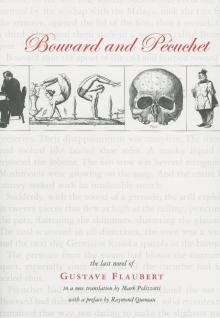 Bouvard and Pecuchet
Bouvard and Pecuchet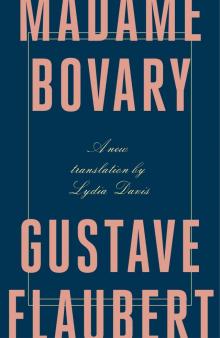 Madame Bovary
Madame Bovary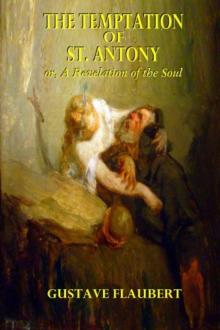 The Temptation of St. Antony
The Temptation of St. Antony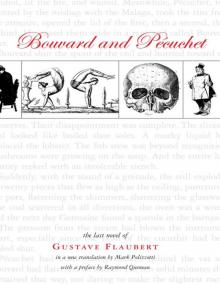 Bouvard and Pécuchet: A Tragi-comic Novel of Bourgeois Life, part 1
Bouvard and Pécuchet: A Tragi-comic Novel of Bourgeois Life, part 1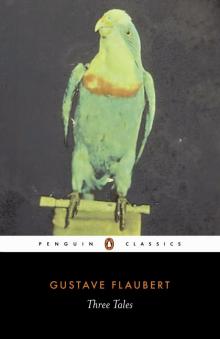 Three Tales
Three Tales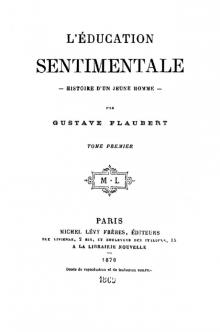 Education sentimentale. English
Education sentimentale. English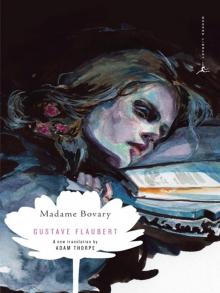 Madame Bovary (Modern Library)
Madame Bovary (Modern Library)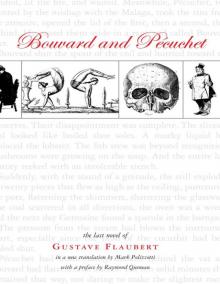 Bouvard and Pécuchet: A Tragi-comic Novel of Bourgeois Life, part 2
Bouvard and Pécuchet: A Tragi-comic Novel of Bourgeois Life, part 2 Sentimental Education; Or, The History of a Young Man. Volume 1
Sentimental Education; Or, The History of a Young Man. Volume 1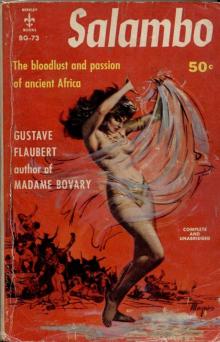 Salammbo
Salammbo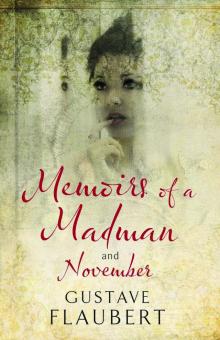 Memoirs of a Madman and November
Memoirs of a Madman and November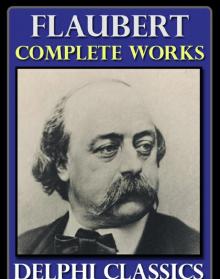 Complete Works of Gustave Flaubert
Complete Works of Gustave Flaubert